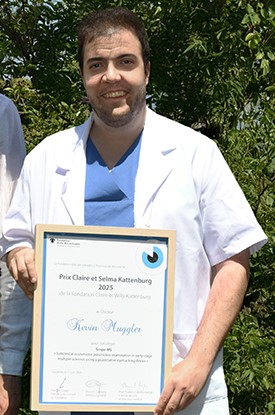The award-winning project, called ‘SCOPE-MS’ and led by Dr Kevin Muggler, tackles a major challenge: the early detection of multiple sclerosis (MS).
This complex neurological disease, which is difficult to diagnose in its early stages, can affect eye movements, sometimes in ways that are imperceptible. The aim of the project is therefore to identify these ‘silent’ disorders using an ultra-precise eye-tracking device, the EyeBrain T2.
As part of the study, 30 patients with recent MS will be compared to 30 healthy individuals.
The device will finely analyse parameters such as latency (reaction time), speed and accuracy of eye movements. This data will be correlated with magnetic resonance imaging (MRI) results to verify whether the ocular abnormalities correspond to brain lesions typical of MS. This innovative approach could pave the way for a non-invasive early diagnostic tool for MS.
